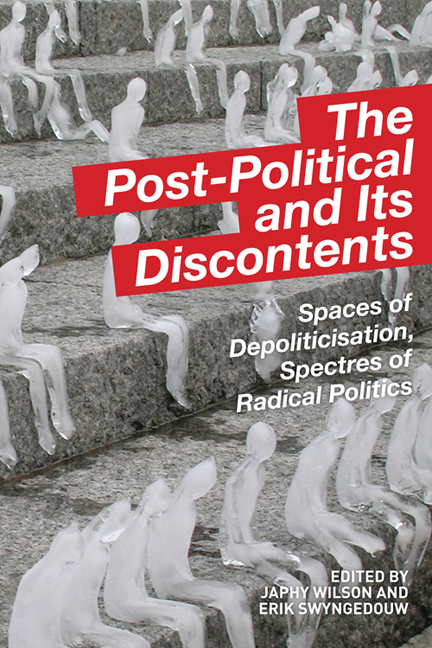Book contents
- Frontmatter
- Contents
- List of Contributors
- Seeds of Dystopia: Post-Politics and the Return of the Political
- Part I Spaces of Depoliticisation
- 1 The Post-Politics of Sustainability Planning: Privatisation and the Demise of Democratic Government
- 2 The Post-Political and the End of Nature: The Genetically Modified Organism
- 3 The New Development Architecture and the Post- Political in the Global South
- 4 Opening Up the Post-Political Condition: Multiculturalism and the Matrix of Depoliticisation
- 5 The Jouissance of Philanthrocapitalism: Enjoyment as a Post-Political Factor
- 6 Religious Antinomies of Post-Politics
- 7 Post-Ecologist Governmentality: Post-Democracy, Post- Politics and the Politics of Unsustainability
- Part II Spectres of Radical Politics
- There Is No Alternative
- Index
5 - The Jouissance of Philanthrocapitalism: Enjoyment as a Post-Political Factor
from Part I - Spaces of Depoliticisation
Published online by Cambridge University Press: 05 August 2016
- Frontmatter
- Contents
- List of Contributors
- Seeds of Dystopia: Post-Politics and the Return of the Political
- Part I Spaces of Depoliticisation
- 1 The Post-Politics of Sustainability Planning: Privatisation and the Demise of Democratic Government
- 2 The Post-Political and the End of Nature: The Genetically Modified Organism
- 3 The New Development Architecture and the Post- Political in the Global South
- 4 Opening Up the Post-Political Condition: Multiculturalism and the Matrix of Depoliticisation
- 5 The Jouissance of Philanthrocapitalism: Enjoyment as a Post-Political Factor
- 6 Religious Antinomies of Post-Politics
- 7 Post-Ecologist Governmentality: Post-Democracy, Post- Politics and the Politics of Unsustainability
- Part II Spectres of Radical Politics
- There Is No Alternative
- Index
Summary
What is needed is a new ‘social contract’ between the rich and everyone else … For the rich, there should be a clear set of rules, so that they know what they must do in order to win society's acceptance. Call this the ‘Good Billionaire Guide’. For everyone else, there should be a clear understanding of how society will behave towards the rich if they abide by these rules … A truly fair social contract might actually allow the rich who give generously more grace than their peers to indulge themselves free from criticism in their yachts, space flights, and Rod Stewart-serenaded birthday parties. Philanthrocapitalism need not go hand in hand with Puritanism. (Bishop and Green 2008: 258)
In ideology, all is not ideology (that is, ideological meaning), but it is this very surplus which is the last support of ideology … The criticism of ideology [must aim] at extracting the kernel of enjoyment, at articulating the ways in which – beyond the field of meaning but still internal to it – an ideology implies, manipulates, produces a pre-ideological enjoyment structured in fantasy. (Žižek 1989: 125)
In Philanthrocapitalism: How the Rich Can Save the World and Why We Should Let Them, the US Business Editor of The Economist, Matthew Bishop, and his co-author Michael Green celebrate the potential for a new form of philanthropy to resolve problems of disease and extreme poverty in Africa and beyond. Unlike traditional philanthropists, who were content to write cheques for good causes, ‘philanthrocapitalists’ such as Bill Gates and George Soros closely monitor their projects, transforming development aid by infusing it with the business principles of innovation, efficiency, and entrepreneurship. Bishop and Green argue that philanthrocapitalism provides the potential basis for a new social contract in Western societies, in which increasing inequality is to be accepted in exchange for ‘the rich regarding their surplus wealth as the property of the many, and themselves as trustees whose duty it is to administer it for the common good’ (Bishop and Green 2008: 15). The book has received widespread acclaim in the international business press and amongst the luminaries of global liberalism.
- Type
- Chapter
- Information
- The Post-Political and Its DiscontentsSpaces of Depoliticisation, Spectres of Radical Politics, pp. 109 - 125Publisher: Edinburgh University PressPrint publication year: 2014



